Florida
Newly introduced Florida bill could destroy LGBTQ nonprofits
It would establish “biological” pronouns as official state policy
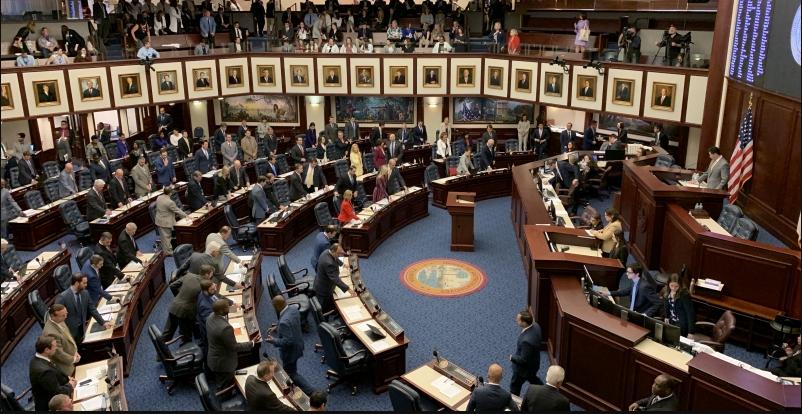
By Erin Reed | A new bill just introduced in Florida aims to expand “Don’t Say Gay Or Trans” provisions to a broad range of workplaces. Targeting government employees, contractors, and nonprofits, the bill sets forth restrictions and bans on policies relating to pronouns, gender identity, and sexuality.
Specifically, it would prohibit state and local government employees as well as any contractors engaged with the government from changing their pronouns or honorifics if they do not match their assigned sex at birth. It would also bar them from instructing on gender identity or sexuality, similar to “Don’t Say Gay Or Trans” laws already active in the state education system. The legislation would establish “biological” pronouns as official state policy.
The bill also would establish protections for what it calls “deeply held biology-based beliefs.” It may even prevent all nonprofits in the state from mandating any “training, instruction, or other activity on sexual orientation, gender identity, or gender expression,” a clause that could destroy LGBTQ+ nonprofits across Florida.
The bill, HB599, was introduced by Representative Ryan Chamberlin, a Republican. The bill is split into two sections, with the first section applying to government employees and contractors, which it defines as “an individual, partnership, corporation, or business entity” that “enters or attempts to enter into a contract for services” with any state, county, municipality, or special district of Florida.
These definitions encompass a huge number of businesses, such as stadiums, convention centers, major hospitals, insurance agencies, and more. For these businesses, as well as for all government workers, the bill would declare that it is the state’s policy that “a person’s sex is an immutable biological trait and that it is false to ascribe to a person a pronoun that does not correspond to such person’s sex.” It then would bar covered employees from sharing pronouns that “do not correspond to that person’s sex,” effectively banning social transition at work for these employees.
See the provisions barring pronouns, honorifics, and more here:
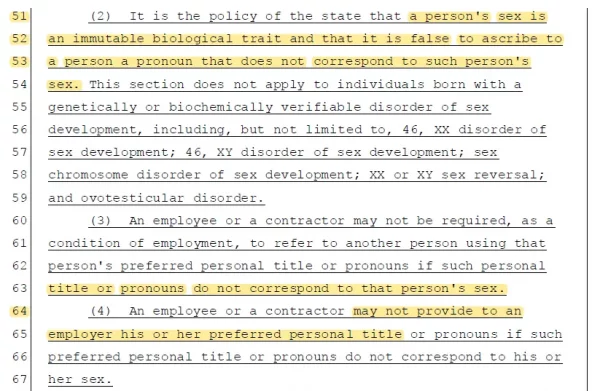
The bill also would enshrine a new phrase into law: protections for employees “deeply held religious or biology-based beliefs.” The phrase “deeply held religious beliefs” has longstanding precedent in constitutional law and is used to overturn laws judged to be violating someone’s freedom of religion.
Deeply held “biology-based” beliefs, however, are not something that has ever been a part of any law. It would appear that this line is meant to provide religious-based protections to people who assert that their misgendering of transgender people and using transgender people’s old names is part of their “biology-based” rights.
The bill is not limited in its application to government employees and contractors, however. A separate section of the bill would apply to “nonprofit organizations or an employer who receives funding from the state.” In the most broad reading of this section, separating “nonprofit organizations” from “employers who receive funding from the state,” it would bar all such organizations from mandating “training, instruction, or other activity on sexual orientation, gender identity, or gender expression.”
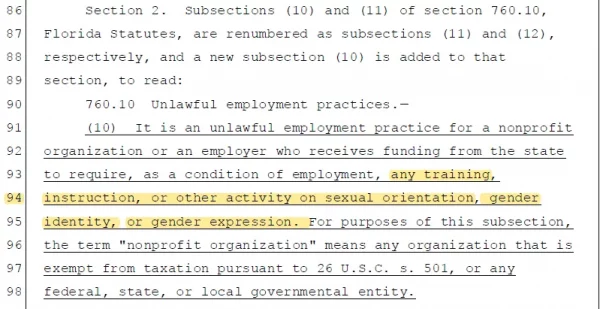
Provisions in HB 599
This provision is severe in its potential impact. Virtually every LGBTQ+ organization would be radically affected by it and would likely have to shut down. It would be nearly impossible for an LGBTQ+ organization to run without providing instruction, training, and “other activity” around gender identity or sexuality. It would be a blatant power grab by the state targeting organizations critical to the government and would further drive LGBTQ+ activism and organizing underground in the state. If enforced broadly, this section could have a similar impact to laws in Russia designed to shut down LGBTQ+ organizations there.
This section would have impacts far beyond LGBTQ+ organizations as well. The provisions would apply to “any organization that is exempt from taxation” including “s. 501” organizations. This would include, for instance, 501c4s, which are crucial during election cycles and could be used to target left-leaning organizations running election ads. Many of these organizations have LGBTQ+ employees and provide instruction and accommodations for their employees, which would be barred by the state if this gets passed into law.
It could also have impacts on medical organizations that do business with state and local governments. Planned Parenthood, a 501c3, heavily provides care for LGBTQ+ people, and such a law could be used to target the organization statewide. Likewise, many state hospital systems that do business with the government often must educate employees and patients on HIV and AIDs, which is impossible to divorce from LGBTQ+ issues. Community health clinics would, similarly, have to contend with these provisions.
'Don't say gay' for nonprofits: @RyanDChamberlin files bill that would restrict LGBTQ nonprofits receiving state funding
— Florida Politics (@Fla_Pol) November 21, 2023
Reporting by @JacobOgleshttps://t.co/oaAfC0gTuz#FlaPol
Brandon J. Wolf, the National Press Secretary for the Human Rights Campaign said to the Blade in a statement Tuesday: “This Florida bill is a hateful, anti-LGBTQ+ monstrosity. It is dangerous, unconstitutional, and we know it’s just the start of politicians’ attacks on our community this legislative session. We’re prepared to fight back.”
This legislation represents an early move in what promises to be a challenging year for anti-LGBTQ+ legislation in 2024. Historically, Florida has often been the breeding ground for new laws aimed at the LGBTQ+ community. This bill might well serve as a precursor to the next “model policy” that could be replicated in multiple states, and bears close watching.
****************************************************************************

Erin Reed is a transgender woman (she/her pronouns) and researcher who tracks anti-LGBTQ+ legislation around the world and helps people become better advocates for their queer family, friends, colleagues, and community. Reed also is a social media consultant and public speaker.
Follow her on Twitter (Link)
Website here: https://www.erininthemorning.com/
******************************************************************************************
The preceding article was first published at Erin In The Morning and is republished with permission.
Cuba
Marytriny, la emperatriz del transformismo
Miami celebrará figura querida el 5 de septiembre, su cumpleaños

El próximo 5 de septiembre, el arte del transformismo en Miami celebra a una de sus figuras más queridas: Alexis Fernández, conocido en el escenario como Marytriny, la emperatriz del transformismo. Su cumpleaños no es solo una fecha en el calendario: es un recordatorio de que la vida, cuando se vive con entrega y disciplina, se convierte en celebración colectiva. Su historia es testimonio, es lucha y es inspiración.
Marytriny nunca actuó en Cuba en sus inicios, pues su personaje nació en Miami, tierra de libertad. No fue hasta el 2014 cuando, por primera vez, tuvo la oportunidad de presentarse en la isla, como si el destino hubiera conspirado a su favor. Alexis viajó entonces a Cuba en medio de un momento político marcado por el acercamiento entre Barack Obama y La Habana. Su madre estaba enferma y aquel viaje coincidió con una invitación del maestro Raúl de la Rosa al Teatro América.
Al finalizar el espectáculo, en el que Marytriny dio vida a la Guarachera de Cuba, la queridísima Celia Cruz, uno de los directivos del teatro se le acercó y le comentó que su interpretación se sintió como si la misma Celia se hubiera presentado en ese escenario. Vale recordar que, desde su salida en 1960, Celia Cruz nunca volvió a Cuba, salvo durante la crisis de los balseros, cuando cantó a los cubanos que permanecían en la Base Naval de Guantánamo.
En esa ocasión única, Marytriny encarnó a Celia como un acto de rebeldía y de búsqueda personal. Fue la primera y única vez que subió a un escenario en la isla, llevando consigo la fuerza de un arte que en Cuba había sido prohibido y silenciado.
Desde sus primeros pasos en Azúcar Night Club en Miami, Marytriny se convirtió en referencia cultural, ícono de comunidad y símbolo de resistencia. Y aquí surge la primera pregunta: ¿Cómo recuerdas esos primeros pasos en Miami, cuando Marytriny empezaba a nacer bajo las luces de la libertad?
La respuesta de Marytriny refleja la autenticidad de su camino.
“Los primeros momentos fueron duros… era todo desconocido para mí, encontrando un espacio para conectar con un público nuevo. Pero entregué toda mi cubanía, alegría y nostalgia de llegar a un país multicultural como esta ciudad de Miami. Fui yo, auténtico, y de pronto la magia de las risas y el aplauso. Fue como un amor a primera vista entre el público y yo. Ya son 26 años y ese amor a lo que hago sigue igual… la gente lo necesita y agradece. Surge el amor incondicional de este arte”.
La disciplina y la entrega lo llevaron más allá del cabaret.
En Telemundo protagonizó la serie “Decisiones”. En América TV formó parte de la novela de larga duración “La Flor de Hialeah”. También trabajó en el cine y en documentales, entre ellos producciones que narraron la vida de Celia Cruz, confirmando que su talento no conoce fronteras. Y entonces aparece la segunda pregunta: ¿Qué significó para ti abrirte paso en la televisión y el cine, y cómo lograste llevar el espíritu de Marytriny más allá de los escenarios nocturnos?
Su voz, firme y reveladora, responde:
“A medida que fue creciendo mi personaje de Marytriny, su voz fue más fuerte, auténtica y llena de verdades silenciadas. Es la voz de muchos que no saben cuál es el camino para encontrar sus libertades y, sobre todo, a quererse y a liberarse de los prejuicios para recuperar esa libertad que nos arrancaron. Difícil hacerlo desde mi personaje… a pesar del tiempo sigue siendo difícil, sobre todo por muchos conservadores que nos siguen atacando. Pero aquí estamos”.
En 2023, la vida lo enfrentó con un reto inesperado: un diagnóstico de cáncer de próstata. Con la transparencia que lo caracteriza, Alexis lo compartió públicamente. Su comunidad respondió con amor y solidaridad, acompañándolo en cada paso. Tras la cirugía, una rosa blanca en su casa se convirtió en símbolo de fe y renacimiento.
En 2024, dio un paso determinante al participar en “Ser Trans”, una producción de TV Martí que expuso la transfobia en Cuba y recuperó las voces que por décadas habían sido silenciadas. Ese mismo año, la obra fue reconocida con un Suncoast Regional Emmy, un galardón que se convirtió en algo más que un premio: fue la constatación de que esas historias tenían un valor innegable y que ya no podían ser relegadas al silencio.
Y entonces llega la tercera pregunta: ¿Qué aprendiste de ti mismo durante la enfermedad y qué mensaje de esperanza quieres dejar a quienes luchan con sus propias batallas?
Marytriny responde con la fuerza de quien ha vencido la tormenta:
“La vida te pone pruebas duras, pero Dios escoge sus guerreros. Esta enfermedad me sirvió para cambiar mi vida y mi forma de pensar, y para ayudar a otros a tomar conciencia, encontrar la fe y dejar un legado de amor. Tolerancia y disciplina son el camino para lograrlo todo… Por eso digo ¡gracias!, y amor con amor se paga”.
Aunque aún faltan algunos días para la celebración de su cumpleaños, desde ya queremos comenzar a celebrar la vida de Alexis Fernández, un artista con más de dos décadas de trayectoria, mentor, voz y presencia de comunidad. Cada vez que Marytriny aparece en escena, no vemos solo a un personaje: vemos a un hombre que convirtió su arte en un canto de libertad, en una afirmación de identidad y en un motivo de orgullo para quienes lo rodean.
El próximo 5 de septiembre, cuando sople las velas, su cumpleaños no pertenecerá solo a él, sino también a todos los que alguna vez rieron, lloraron o se reconocieron en Marytriny. Porque su vida no es solo espectáculo: es un acto de amor y de resistencia. Y cuando caiga el telón, quedará claro que hemos sido testigos de algo más grande que un show: la vida misma de una emperatriz que brilla más que las estrellas.
Florida
Federal judge blocks Fla. trans health care ban and restrictions
Republican Gov. Ron DeSantis plans to appeal ruling
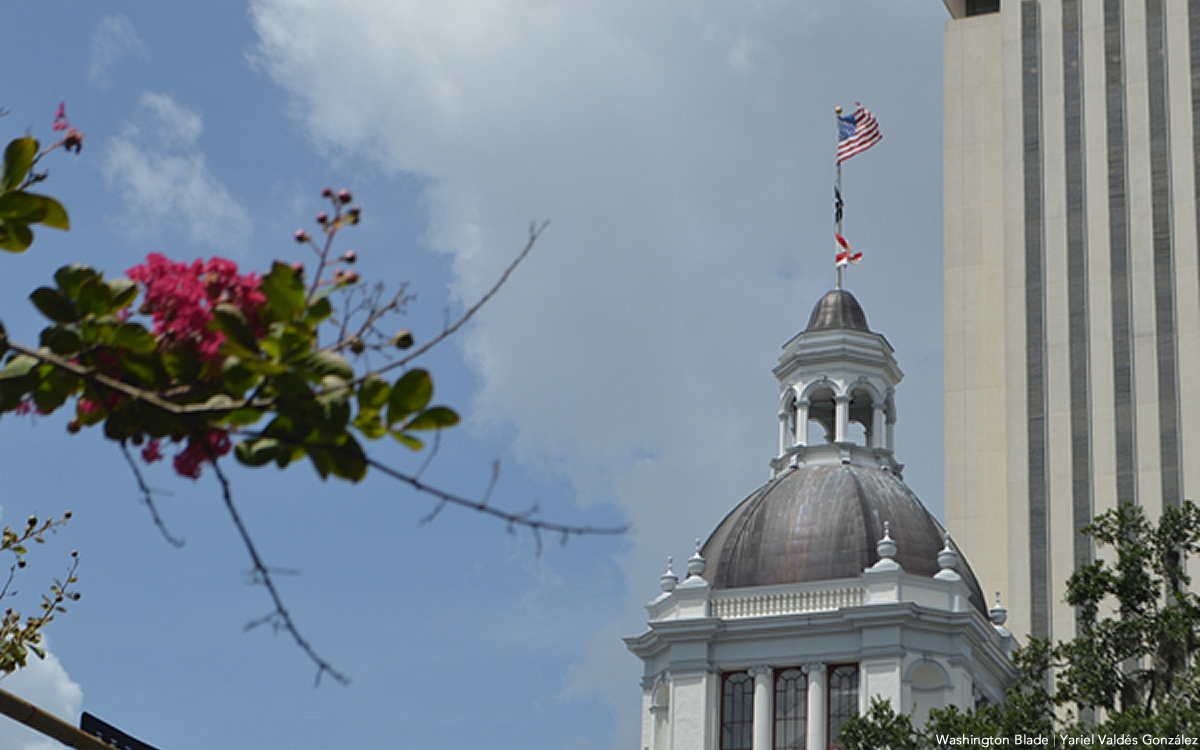
BY JACKIE LLANOS | Florida’s ban on puberty blockers and hormone replacement therapy for transgender minors and restrictions for adults are both unconstitutional, a federal judge ruled Tuesday.
U.S. District Judge Robert Hinkle, who presided over the case in Tallahassee, sided with the plaintiffs in the class action — parents of trans minors and trans adults — who argued the measure violated the U.S. Constitution because it solely targeted trans people.
“The federal courts have a role to play in upholding the constitution and laws. The state of Florida can regulate as needed but cannot flatly deny transgender individuals safe and effective medical treatment — treatment with medications routinely provided to others with the state’s full approval so long as the purpose is not to support the patient’s transgender identity,” Hinkle wrote.
Those restrictions came into place following Gov. Ron DeSantis’ approval of Senate Bill 254 in May 2023 and promulgation of rules from the Florida Board of Medicine and Florida Board of Osteopathic Medicine enacting that law. Those boards and Florida Surgeon General Joseph Ladapo were named as defendants.
The measures banned minors’ use of puberty blockers and hormone replacement therapy, common treatments for gender dysphoria. Additionally, the law said only physicians, psychologists, and psychiatrists could treat adults seeking gender-affirming care, with the added requirements of frequent in-person visits, tests, and authorization through a consent form that contained false information about the harms of hormone replacement therapy.
However, the law didn’t impose the same restrictions on cisgender women needing to take testosterone or cisgender men needing to take estrogen.
Appeal incoming
The state plans to appeal the ruling, said Jeremy Redfern, press secretary to DeSantis. An appeal would go to the 11th U.S. Court of Appeals.
“Through their elected representatives, the people of Florida acted to protect children in this state, and the court was wrong to override their wishes,” Redfern wrote in a statement to Florida Phoenix.
“We disagree with the court’s erroneous rulings on the law, on the facts, and on the science. As we’ve seen here in Florida, the United Kingdom, and across Europe, there is no quality evidence to support the chemical and physical mutilation of children. These procedures do permanent, life-altering damage to children, and history will look back on this fad in horror.”
Redfern wrote that the state would continue to “fight to ensure children are not chemically or physically mutilated in the name of radical, new age ‘gender ideology.’”
In his 105-page ruling, Hinkle noted that “there were no complaints from patients, no adverse results in Florida, just a political issue.”
However, the ruling does not lift the state ban on gender-affirming surgery for minors and restrictions on surgery for adults. That’s because the plaintiffs didn’t challenge the statutes relating to surgery for minors, and the adult plaintiff had not sought surgery and so lacked standing to challenge those restrictions.
Relief for plaintiffs
Plaintiff Gloria Goe (they used pseudonyms to protect the privacy of their children) is the mother of an 8-year-old (at the opening of the case) trans boy. During the opening day of the trial on Dec. 13, she testified that she feared her son would be swallowed by depression if forced to go through puberty without medical treatment.
“This ruling lifts a huge weight and worry from me and my family, knowing I can keep getting Gavin the care he needs, and he can keep being the big-hearted, smiling kid he is now. I’m so grateful the court saw how this law prevented parents like me from taking care of our children,” Goe wrote in a press release.
Attorneys with GLBTQ Legal Advocates and Defenders, Human Rights Campaign Foundation, National Center for Lesbian Rights, Southern Legal Counsel, and the Lowenstein Sandler law firm represented the plaintiffs.
Hinkle compared the discrimination trans people face nowadays to racism and misogyny.
“Some transgender opponents invoke religion to support their position, just as some once invoked religion to support their racism or misogyny,” Hinkle wrote. “Transgender opponents are of course free to hold their beliefs. But they are not free to discriminate against transgender individuals just for being transgender. In time, discrimination against transgender individuals will diminish, just as racism and misogyny have diminished.”
Editor’s note:
In a statement made to the Los Angeles Blade after Tuesday’s rule, Shannon Minter, the legal director for the National Center for Lesbian Rights said:
“This decision is important because is the first federal court to rule on a law restricting healthcare for transgender adults and because it finds that Florida’s laws are plainly based on anti-transgender bias, not science. This victory shows that we can and must keep fighting these dangerous laws, notwithstanding the deeply flawed rulings of some conservative appellate courts.
Judge Hinkle ruled in favor of the transgender plaintiffs in this case even after the negative 11th Circuit ruling that reversed our initially successful challenge to a similar ban in Alabama. He was able to do so because the evidence showing that these laws have no medical justification and are rooted in false stereotypes and bias was so strong. This is a huge victory, and one that shows that we can win these battles even in red states.”
******************************************************************************************

Jackie Llanos is a recent graduate of the University of Richmond. She has interned at Nashville Public Radio, Virginia Public Media, and Virginia Mercury.
******************************************************************************************
The preceding article was previously published by The Florida Phoenix and is republished with permission.
The Phoenix is a nonprofit news site that’s free of advertising and free to readers. We cover state government and politics with a staff of five journalists located at the Florida Press Center in downtown Tallahassee.
We’re part of States Newsroom, the nation’s largest state-focused nonprofit news organization.
Florida
Homeless transgender woman murdered in Miami Beach
Andrea Doria Dos Passos attacked while she slept
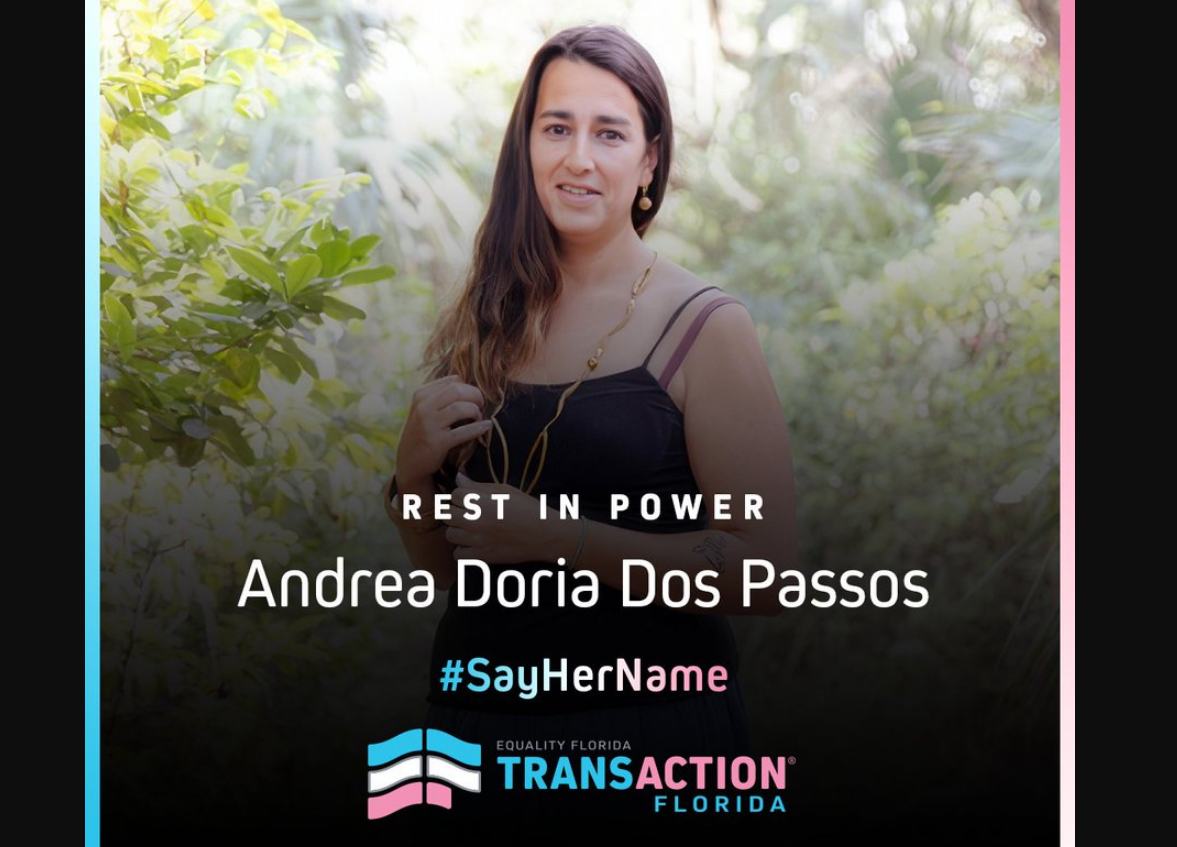
Gregory Fitzgerald Gibert, 53, who was out on probation, is charged with the second-degree murder of 37-year-old Andrea Doria Dos Passos, a transgender Latina woman who was found deceased in front of the Miami Ballet company facility by a security guard this past week.
According to a Miami Beach Police spokesperson the security guard thought Dos Passos was sleeping in the entranceway around 6:45 a.m. on April 23 and when he went to wake her he discovered the blood and her injuries and alerted 911.
She was deceased from massive trauma to her face and head. According to Miami Beach police when video surveillance footage was reviewed, it showed Dos Passos lying down in the entranceway apparently asleep. WFOR reported: In the early morning hours, a man arrived, looked around, and spotted her. Police said the man was dressed in a black shirt, red shorts, and red shoes.
At one point, he walked away, picked up a metal pipe from the ground, and then returned. After looking around, he sat on a bench near Dos Passos. After a while, he got up and repeatedly hit her in the head and face while she was sleeping, according to police.
“The male is then seen standing over her, striking her, and then manipulating her body. The male then walks away and places the pipe inside a nearby trash can (the pipe was found and recovered in the same trash can),” according to the arrest report.
Police noted that in addition to trauma on her face and head, two wooden sticks were lodged in her nostrils and there was a puncture wound in her chest.
Victor Van Gilst, Dos Passos’s stepfather confirmed she was trans and experiencing homelessness.
“She had no chance to defend herself whatsoever. I don’t know if this was a hate crime since she was transgender or if she had some sort of interaction with this person because he might have been homeless as well. The detective could not say if she was attacked because she was transgender,” said Van Gilst.
“She has been struggling with mental health issues for a long time, going back to when she was in her early 20s. We did everything we could to help her. My wife is devastated. For her, this is like a nightmare that turned into reality. Andrea moved around a lot and even lived in California for a while. She was sadly homeless. I feel the system let her down. She was a good person,” he added.
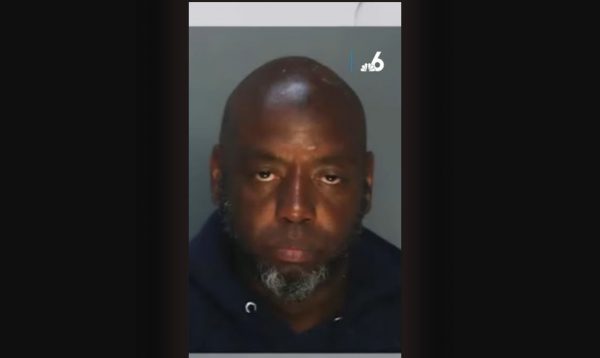
The Miami Police Department arrested Gibert, collected his clothing, noting the red shorts were the same type in the video and had blood on them. Blood was also found on his shoes, according to police. He was taken into custody and charged.
“The suspect has an extensive criminal record and reportedly was recently released from custody on probation for prior criminal charges. Police apprehended the suspect in the city of Miami and the investigation is currently ongoing. This case is further evidence that individuals need to be held accountable for prior violent crimes for the protection of the public. We offer our sincere condolences to the family and friends of the victim,” Miami Beach Mayor Steve Meiner said in a statement.
Joe Saunders, senior political director with LGBTQ rights group Equality Florida, told the Miami Herald that “whenever a transgender person is murdered, especially when it is with such brutality, the question should be asked about whether or not this was a hate-motivated crime.”




















